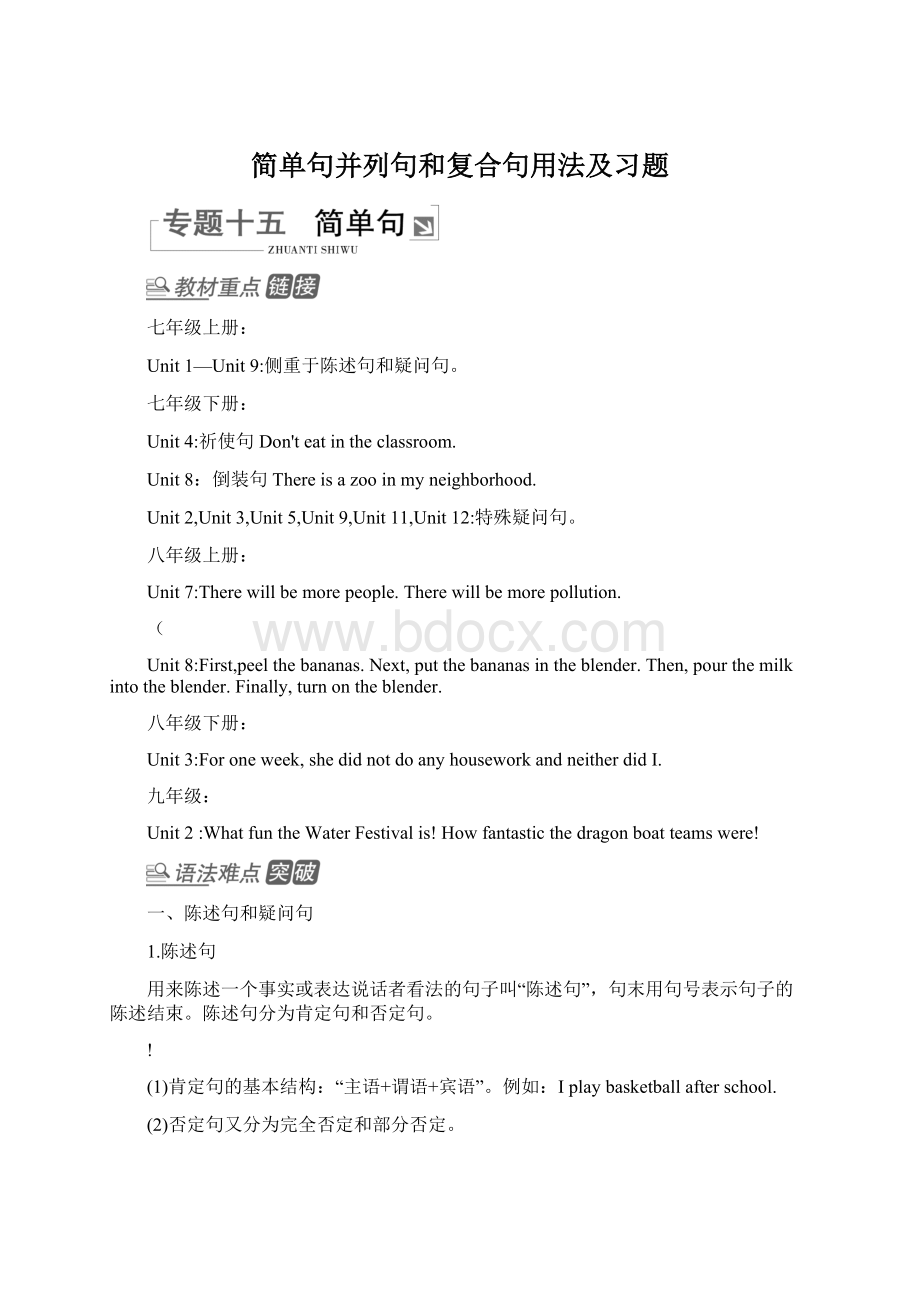简单句并列句和复合句用法及习题.docx
《简单句并列句和复合句用法及习题.docx》由会员分享,可在线阅读,更多相关《简单句并列句和复合句用法及习题.docx(26页珍藏版)》请在冰豆网上搜索。

简单句并列句和复合句用法及习题
七年级上册:
Unit1—Unit9:
侧重于陈述句和疑问句。
七年级下册:
Unit4:
祈使句Don'teatintheclassroom.
Unit8:
倒装句Thereisazooinmyneighborhood.
Unit2,Unit3,Unit5,Unit9,Unit11,Unit12:
特殊疑问句。
八年级上册:
Unit7:
Therewillbemorepeople.Therewillbemorepollution.
(
Unit8:
First,peelthebananas.Next,putthebananasintheblender.Then,pourthemilkintotheblender.Finally,turnontheblender.
八年级下册:
Unit3:
Foroneweek,shedidnotdoanyhouseworkandneitherdidI.
九年级:
Unit2:
WhatfuntheWaterFestivalis!
Howfantasticthedragonboatteamswere!
一、陈述句和疑问句
1.陈述句
用来陈述一个事实或表达说话者看法的句子叫“陈述句”,句末用句号表示句子的陈述结束。
陈述句分为肯定句和否定句。
!
(1)肯定句的基本结构:
“主语+谓语+宾语”。
例如:
Iplaybasketballafterschool.
(2)否定句又分为完全否定和部分否定。
①完全否定词有not,no,noone,nobody,nothing,neither,none,never。
例如:
NoneofushavebeentoCanada.
②部分否定词有hardly,seldom,few,little以及not与both,all,each,every,quite,always等连用所表示的部分否定。
例如:
Icanhardlyseeanythingintheallstudentscometoschoolbybus.
2.疑问句
用来表示提问的句子叫作“疑问句”,句末用问号。
疑问句包括一般疑问句、特殊疑问句、选择疑问句和反意疑问句4种。
(1)一般疑问句
①以系动词be开头的疑问句。
例如:
Areyouastudent
②以助动词开头的疑问句。
例如:
DoyouspeakFrench
③以情态动词开头的疑问句。
例如:
Canyoudance
》
(2)特殊疑问句
用特殊疑问词引导的疑问句叫“特殊疑问句”。
特殊疑问词包括疑问代词、疑问副词和由疑问词构成的疑问短语。
①常用疑问代词:
what什么;who谁;whom谁(who的宾格);which哪个(些);whose谁的。
例如:
Whatareyoudoing
②常用疑问副词:
when何时;where何地;how怎么;why为什么。
例如:
Whereareyougoingtomorrow
③常用疑问短语:
whattime什么时刻;howmany/much多少;howoften多久一次;howsoon多久;howlong多长时间;howfar多远;howold多大(年龄);howbig多大。
例如:
—Howlonghaveyoubeenhere—For10minutes.
(3)选择疑问句
用来在两种或两种以上情况中进行选择的疑问句叫作“选择疑问句”。
答语不能用Yes/No回答,而应从问句中选择一种情况进行回答。
①一般选择疑问句的构成:
一般疑问句+or+被选择的内容例如:
—Areyouateacheroradoctor—I'mateacher.
②特殊选择疑问句的构成:
特殊疑问句+AorB例如:
Whichdoyoulikebetter,teaorcoffee
(4)反意疑问句
%
附在陈述句后对陈述内容进行反问的句子叫“反意疑问句”,也叫“附加疑问句”。
反意疑问句前一部分是陈述句,后一部分是简短问句。
陈述部分用逗号结尾,疑问部分用问号结尾。
例如:
It'saniceday,isn'tit
①疑问部分的主语必须与陈述部分的主语一致;当陈述部分的主语是名词或代词时,疑问部分要用相应的人称代词。
例如:
comesfromtheUK,doesn'the
②疑问部分要与陈述部分的时态保持一致。
例如:
Tomwenttothecinemayesterday,didn'the
③答语是肯定的用“Yes”;答语是否定的用“No”。
前否后肯的反意疑问句的答语yes译为“不”,no译为“是的”。
例如:
—Anndidn'tcometoschoollastweek,didshe—No,shedidn'wasill.
特别提醒
反意疑问句的特殊形式
①陈述部分是Iam...,疑问部分用aren'tI。
例如:
I'myourbestfriend,aren'tI
②当陈述部分是therebe结构时,疑问部分用there。
例如:
Therearemanybirdsinthetree,aren'tthere
③当陈述部分的主语是指示代词this,that时,疑问部分的主语用it;当陈述部分的主语是these或those时,疑问部分的主语用they。
例如:
ThisisanEnglishcar,isn'titTheseareRussianplanes,aren'tthey
④当陈述部分含有never/nothing/none/noone/seldom/hardly/few/little等否定词时,疑问部分用肯定形式。
例如:
Shehasneverbeenabroad,hasshe
^
⑤如果陈述部分含有由否定前缀im-,dis-,un-等构成的否定意义的词,则陈述部分作肯定处理,疑问部分仍用否定形式。
例如:
Maryisunhappy,isn'tshe
⑥当陈述部分的主语是不定代词something/anything/everything/nothing等时,疑问部分中代词用it。
例如:
Nothingiswrongwiththecomputer,isit
⑦当陈述部分的主语为somebody/someone/anybody/anyone/everybody/everyone等时,疑问部分中代词用they或he,注意问句动词的数应与they/he保持一致。
例如:
Everyonehasknownthenews,hasn'the/haven'tthey
⑧祈使句的反意疑问句
a.祈使句是肯定形式,其反意疑问句中的疑问部分用willyou或won'tyou皆可。
例如:
Besuretowritetous,will/won'tyou
b.祈使句是否定形式,其反意疑问句中的疑问部分通常只用willyou。
例如:
Don'tsmokeinthemeetingroom,willyou
c.以let开头的祈使句构成反意疑问句时,let's用shallwe构成反意疑问句,其他均用willyou。
例如:
Let'stakeawalkaftersupper,shallweLettheboygofirst,willyou
⑨当陈述部分是Ithink/Isuppose/Ibelieve/Iconsider等结构时,疑问部分一般与从句保持一致。
注意“否定前移”。
例如:
Ithinkyoucandoitbetternexttime,can'tyouIdon'tbelievetherewillberobotsatpeople'shomes,willthere
二、感叹句
1.以what引导
:
(1)What+a/an+adj.+单数可数名词+主语+谓语!
例如:
Whatabeautifulmountainitis!
(2)What+adj.+可数名词复数+主语+谓语!
例如:
Whatgreatinventionshehasmade!
(3)What+adj.+不可数名词+主语+谓语!
例如:
Whatbadweatheritistoday!
2.以how引导
(1)How+adj.+a/an+可数名词单数+主语+谓语!
例如:
Howcleveraboyheis!
(2)How+adj./adv.+主语+谓语!
例如:
HowquicklyTomruns!
三、祈使句
祈使句表达说话人对对方的劝告、叮嘱、建议、请求或命令等。
主语you通常省略,谓语动词用原形,句末用感叹号或句号。
表达请求或劝告时,祈使句句末或句首可以加上please表示委婉的语气。
1.肯定祈使句
#
(1)Do型:
动词原形(+宾语)+其他成分。
例如:
Pleasehaveaseat.
(2)Be型:
Be+表语(名词或形容词)+其他成分。
例如:
Bequiet.
(3)Let型:
Let+宾语+动词原形+其他成分。
例如:
Letmehelpyou.
2.否定祈使句
(1)Do型和Be型的否定式都是在句首加don't构成。
例如:
Don'tforgetme!
Don'tbelateforschool!
(2)Let型的否定式有两种:
“Don't+let+宾语+动词原形+其他成分”和“Let+宾语+not+动词原形+其他成分”。
例如:
Don'tlethimgo./Lethimnotgo.
(3)有些可用no开头,用来表示禁止。
例如:
Nosmoking!
四、倒装句
英语句子一般主语在前,谓语在后。
但有时因为语法结构的要求或为了表达特殊的强调部分,会把句中的谓语提到主语前面,这种句子叫“倒装句”。
倒装句的常见句式:
be句型
&
(1)Therebe句型表示“存在”,主语在be的后面。
例如:
Thereissomecoffeeinthecup.
特别提醒
therebe与have的区别
①Therebe结构表示“某地有某人/某物”,强调客观存在。
②have表示“(某人)拥有某物”,强调所属关系。
例如:
hastwodaughters.
(2)Therebe句型的句式变化
①对Therebe句型中的主语提问:
What's+地点状语/时间状语例如:
Therearemanybirdsintheforests.→What'sintheforests
②对Therebe句型中数量的提问:
Howmany+可数名词复数+arethere+地点状语
Howmuch+不可数名词+isthere+地点状语
、
③Therebe句型中,反意疑问句的疑问部分应用there。
例如:
There'snoaironthemoon,isthere
+助动词/系动词be/情态动词+主语,表示“……也是”。
表示与上文中所述肯定情况相同。
例如:
─Jacklikesriceforlunch.─SodoI.
特别提醒
“So+主语+助动词/系动词be/情态动词”表示“确实如此”,表示对上文所述情况的认可和肯定。
例如:
─Jacklikesriceforlunch.─Sohedoes.
+助动词/系动词be/情态动词+主语
表示与上文中所述否定情况相同。
例如:
─PeterhasneverbeentoJapan.─NeitherhaveI.
4.以副词开头的倒装句
以here,there,out,in,down,away等表示方位的副词开头的句子中,如果主语是名词,要用倒装句。
谓语动词的形式由倒装句句尾的主语决定。
例如:
Therecomesthearetheresultsofthetest.
《
1.—______
—It'scloudy.
'stheweather
wastheweatherlike
'stheweatherlike
istheweather
2.—doesLindawanttobewhenshegrowsup
—AtennisplayerlikeLiNa.
—
meane-mailbeforeyoucometo'llmeetyouattheairport.
send
toomuchrubbishandwastebythesideoftheroad.
mecollectthesebooks,______
youyou
youyou
6.weatheritis!
WecangoboatingontheDongchangLake.
badgood
goodbad
}
7.—interestingthefilmis!
—haveseenittwice.
anan
8.—Mum,mustIgoshoppingwithyou
—No,you.YoucanwatchthefilmMonsterHuntwithyourbrothers.
't't
't't
9.—doyoulikeHuoZun's“RollofBeadCurtain”
—VeryknowIlovesongsthatbothhavegreatlyricsandbeautifulrhythm.
,
10.—TheradiosaysitwillrainnextSunday.
—.We'regoingforapicnicthatday.
hopeitwill'mafraidnot
don'tthinksohopenot
israininggoout.
betternotbetternotto
notbetterhadbetter
12.—dothechildrentakeartlessonsaweek
)
—Threeorfourtimes.
longmanytimes
soonoften
13.—______smokehere,hasbeenbanned(禁止)inpublicplaces.
—Sorry,IpromiseI______.
;will't;won't
't;don't;won't
14.—Hecanremember100groupsofnumbersinfiveminutes.
—manheis!
asmartsmart
】
astupidstupid
15.—Wefailedinthesingingcompetition.
—timesarewaitingforyou.
donewishes
upjob
16.Ifyougoforapicnic,.
't;sowillI
't;soIwill
't;neitherwillI
't;neitherIwill
》
17.—areyougoingtotheSchoolUniformExhibition,Amy
—Tolearnaboutdifferentstylesofschooluniforms.
18.—MonahasneverbeentoDisneyland,hasshe
—.'sbeentheretwicewithherparents.
shehasn't,shehas
shehas,shehasn't
19.—Sorrysir,I'vemadesomanymistakesinthispaper.
—It'sOK..Thispaperisverydifficult.
'
haveotherstudents
dootherstudents
dootherstudents
haveotherstudents
20.rolesheplayedinthemovie!
That'swhyshehasalotoffans.
interesting
aninteresting
interesting
aninteresting
21.—Ginahasmadegreatprogressthisterm.
)
—and.
shehas;sohaveyou
shehas;soyouhave
hasshe;soyouhave
hasshe;sohaveyou
22.—,Emma
—IneedshouldIbuyformymother'sbirthday
'sitgoing
'son
'sup
/
'syourmother
23.—Doyoulikeasmall,mediumorlargepizza
—.
'dlikeamediumpizza
Ilike
'dlikesomecheeseonit
wantbuysome
24.—It'sveryhotintheroom!
—thedooropen
don'tkeepdon'ttokeep
—
notkeepnotyoutokeep
25.—I'mnotgoingswimmingthisafternoon.
—.Ihavetohelpmymotherdosomecleaning.
amIIam
amIIam
26.—Mygrandpaisusedtolivinginthecity.
—.
mygrandpais
ismygrandpa
mygrandpadid
、
mygrandpadoes
27.—Remembertowritedownyournameonthepaper.
—.
mindpleasure
Iwill'sallright28.—canyouhandinyourhomework,Tim
—Inabouttenminutes,.
longsoon
oftenfar
bypractisingafewhourseverydaybeabletobecomeapianistoneday.
canyou
(
youwill
30.Idon'tthinktheywouldbelieveher,
Ithey
'ttheyI
1.(2018·滨州)—_______convenientitistoliveinChina!
—Yes,we'vegotWeChat,sharedbikes,Alipay,etc.
a
a
2.(2018·福建)—_______doesLiuChuanjiando
/
—He'sapilotofSichuan'sahero!
3.(2018·安顺)—Thereislittlemoneyfortobuyaticketfortoday'sshow,_______
—Exactly!
there'tthere
'ttherethere
4.(2018·恩施)—_______,oryouwon'tdowellinyourlessons.
—will.
workhard
'tworkhard
[
5.(2018·南京)—______isitfromtheChildren'sPalacetoNanjingSouthRailwayStation,Tom
—About10minutes'ridebybus.
soonlong
farmuch
6.(2018·重庆)______meachanceandI'llbringyouasurprise.
give
七年级上册:
Unit5:
Wegotothesameschoolandwelovesoccer.
-
Unit6:
Ilikeice-cream...butIdon'teatit.
七年级下册:
Unit5:
—Whydon'tyouliketigers—Becausethey'rereallyscary.
八年级上册:
Unit3:
Tinathinkssheworksharderthanme.
Unit10:
Whatwillhappeniftheyhavethepartytoday
八年级下册:
Unit4:
Heshouldtalktohisfriendsothathecansayhe'ssorry.
Unit5:
WhileLindawassleeping,JennywashelpingMarywithherhomework.
Unit6:
Becausetheyweresobigthatittookalongtimetowalktotheotherside.
—
Hecannotturnhimselfintoamanunlesshecanhidehistail.
九年级:
Unit2:
IwonderwhetherJuneisagoodtimetovisitHongKong.
IbelievethatAprilisthehottestmonthinThailand.
Unit3:
Couldyoutelluswhenthebandstartsplayingthisevening
Unit9:
Shelikesmusicianswhoplay